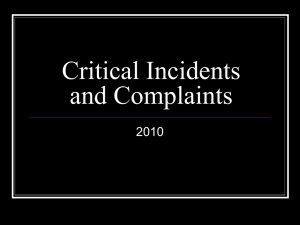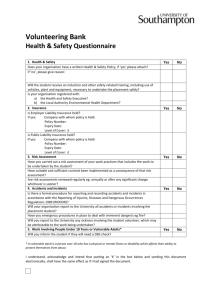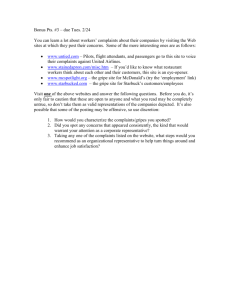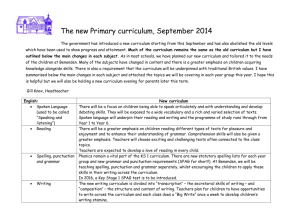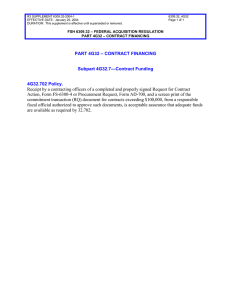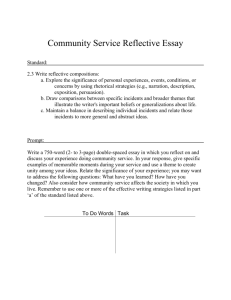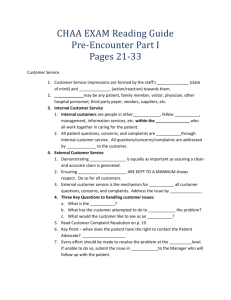Year on year the hospital identifies a number of quality... improvement focus is maintained. For the years 2010 to... Part 2 Looking forward.
advertisement
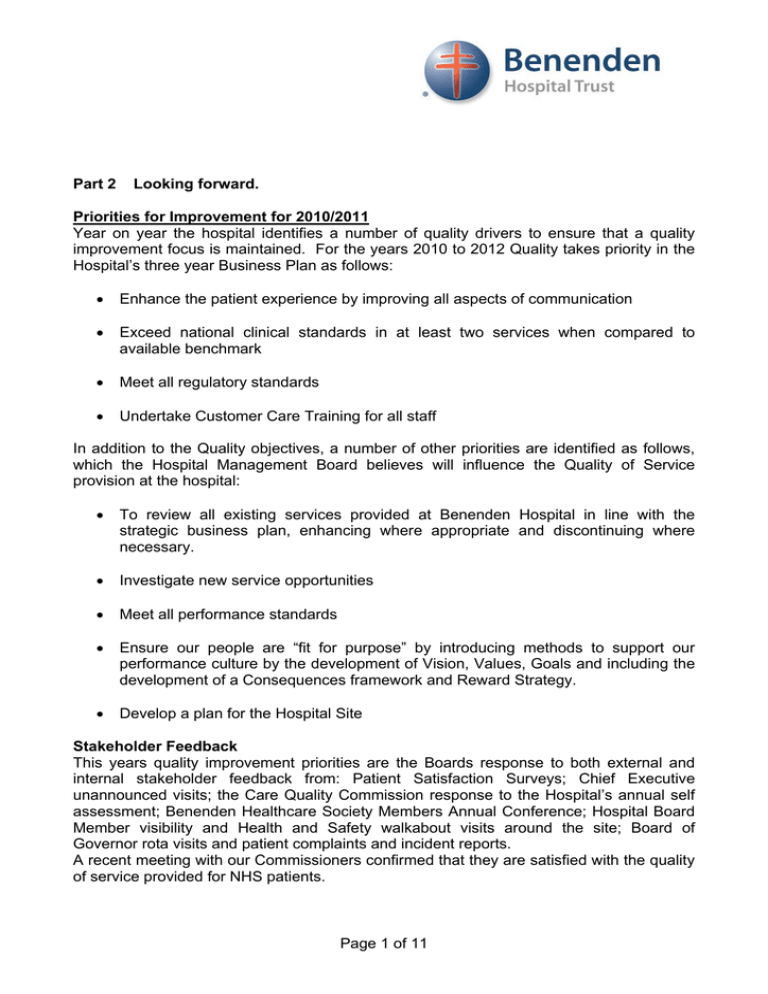
Part 2 Looking forward. Priorities for Improvement for 2010/2011 Year on year the hospital identifies a number of quality drivers to ensure that a quality improvement focus is maintained. For the years 2010 to 2012 Quality takes priority in the Hospital’s three year Business Plan as follows: • Enhance the patient experience by improving all aspects of communication • Exceed national clinical standards in at least two services when compared to available benchmark • Meet all regulatory standards • Undertake Customer Care Training for all staff In addition to the Quality objectives, a number of other priorities are identified as follows, which the Hospital Management Board believes will influence the Quality of Service provision at the hospital: • To review all existing services provided at Benenden Hospital in line with the strategic business plan, enhancing where appropriate and discontinuing where necessary. • Investigate new service opportunities • Meet all performance standards • Ensure our people are “fit for purpose” by introducing methods to support our performance culture by the development of Vision, Values, Goals and including the development of a Consequences framework and Reward Strategy. • Develop a plan for the Hospital Site Stakeholder Feedback This years quality improvement priorities are the Boards response to both external and internal stakeholder feedback from: Patient Satisfaction Surveys; Chief Executive unannounced visits; the Care Quality Commission response to the Hospital’s annual self assessment; Benenden Healthcare Society Members Annual Conference; Hospital Board Member visibility and Health and Safety walkabout visits around the site; Board of Governor rota visits and patient complaints and incident reports. A recent meeting with our Commissioners confirmed that they are satisfied with the quality of service provided for NHS patients. Page 1 of 11 Multidisciplinary Audit Building on the successful programme developed in 2008, the 2009 programme incorporated a wider number of specialties, including some non-clinical specialties. A total of 13 audits and a number of Clinical update sessions were delivered during the year. The range of specialties that presented their audits included General Surgery, Gynaecology, Gastroenterology, Ear Nose & Throat, Anaesthetics, Radiology, Microbiology and Haematology and Infection Control. There were also sessions on Patient Safety, Clinical Coding and Accountability. The Hospital has also continued to undertake a number of Endoscopy Service audits as part of the requirement of the Global Rating Scale, an NHS initiative that the Hospital has signed up to in order to ensure best practice in the delivery of our Endoscopy Service. The following are examples of how we have learnt from feedback by listening to our stakeholders or as a result of findings from audits or from reported incidents and complaints. They are reported under one of 3 categories: Patient Safety, Clinical Effectiveness and Patient Experience. Patient Safety Informed consent As part of the informed consent process, patients are advised about the rates of surgical complications nationally in relation to their planned procedure and or condition. We acknowledge that local data may not be readily available to our patients and we will work with our clinicians to develop the reporting of all surgical complications and outcomes of surgery in order to provide this information to our patients. Specialty outcomes will be reported through the Patient Safety Committee and thus to Integrated Governance and the Hospital Management Board in the quarterly Governance reports. Benenden Hospital is also signed up to the Independent Healthcare Advisory Service initiative to report outcome measures and benchmark against other Independent Sector hospitals. Surgical checklist Following the successful introduction of the surgical safety checklist within the operating theatre, work is ongoing to improve compliance and efficacy of this valuable patient safety tool. Further specific safety checklists are being developed and introduced nationally. With this in mind, we will work alongside stakeholders to ensure further patient safety tools are introduced in a timely way to provide assurance that patient safety remains at the top of the hospital agenda. All work related to Patient Safety will be reported to the Patient Safety Committee for discussion, agreement and monitoring. Minutes of the meeting will be forwarded to Integrated Governance and so to the Hospital Management Board. Page 2 of 11 Clinical Effectiveness Pain relief An audit of pain scores following laparoscopic cholecystectomy showed that the scores were higher than expected. Action taken has resulted in routine liver bed infiltration with local anaesthetic solution peri-operatively and this has improved postoperative pain scores.A repeat audit will be undertaken during the next six months and the results reported to the Pain Team Following two written complaints relating to pain during EVLT (Endo Venous Laser Treatment) an audit was undertaken. This is a modern treatment for varicose veins. This supported the patient perspective and action has now been taken to improve the pain scores by administering Intra Venous Paracetamol before the procedure and also administering a sedative as required. Patient Information was also reviewed and amended. A repeat audit will be undertaken during the next six months and the results reported to the Pain Team Post op Incident As part of the learning process, all incidents and complaints reported are reviewed and investigated where necessary and learning points identified. If relevant in order to reduce further risks to patients, changes are made to clinical and non clinical practice. Learning however does not always necessitate change in practice but they all involve reflection and discussion. One incident that required Root Cause Analysis led to a review of positioning of patients for specific surgical procedures and further staff training in this regard. Training updates for all theatre staff were carried out and alternative surgical drapes trialled to facilitate a clearer view of patient limb positioning. No further incidents have occurred. Patient Experience Patient Feedback survey The 2009 In-Patient and Day Case Patient Survey demonstrated a very high quality of care, however there are always some areas for improvement. The most important feedback being that In Patients were waiting too long from admission to time going to theatre. Work is ongoing to introduce staggered admissions to reduce the waiting time to Theatre. This process will be monitored via a number of routes such as audits and patient satisfaction feedback and reported to Integrated Governance quarterly. Comfort Audit As the result of a comparative audit undertaken as part of the Global Rating Standards (GRS) for assessing 3 levels of comfort during endoscopy, (comfortable, moderate discomfort and extreme discomfort) action was taken to improve pre investigation communication between staff and patient resulting in a decrease in those reporting extreme discomfort and an increase in those reporting that they were either comfortable or had moderate discomfort. The audit will be repeated six monthly to monitor continuous improvement in comfort during endoscopy. Page 3 of 11 Research Benenden Hospital is unique within the Independent Sector in that it supports appropriate research on site involving consenting members in order to improve practice and strive to inform medical advances in those specialties undertaking the research. Currently, the research being undertaken is within Gynaecology and General Surgery. The work undertaken is supported by a Research Advisor and Research Committee. Following Research undertaken during 2009, some changes to clinical practice have been made in both specialties. Part 3 Looking back and review of performance One of the best ways to progress in any organisation is to review the past to identify the successes and to highlight the areas where there is need for improvement. In looking at our successes we are proud to say that Benenden Hospital is accredited for Information Security Organisation (ISO) 27001 and Investors in People. Integrated Governance In order to assure the Board of Governors and the Hospital Management Board of safety and effectiveness in all aspects of risk management, an Integrated Governance approach has been developed. The purpose is to: • Inform all stakeholders including; staff, members of Benenden Healthcare Society and all users of our services of the principles underpinning Governance arrangements within the hospital including Committee structures, Policies and reporting. • Detail the systems of control and assurance adopted by the Hospital’s Board of Governors and Management Board to ensure that the hospital operates in accordance with legal and national requirements including: - Ethical principles - Regulatory Framework - Sound Risk Management standards A schematic of the Committee structure is set out over the page, highlighting the importance of such risk components as; Patient Safety; Infection Control; Occupational Health and Safety; Resuscitation and Research. Page 4 of 11 Page 5 of 11 The Integrated Governance Committee (IGC) oversees all business and actions of the Risk Committee’s for assurance and the minutes of the IGC taken the Management Board on a quarterly basis for information, discussion and assurance along with a number of other reports as follows: • Integrated Governance Quarterly and Annual Reports • Complaints Quarterly and Annual Reports • Clinical Indicator Reports • High Level Risk Register • Financial Reports and Key Performance Indicators The following extract is taken from the 2009 Integrated Governance Annual Report. The information contained in this report has been compiled using data and feedback obtained from both external and internal stakeholders as identified earlier in the report. INCIDENT REPORTING The tables and graphs below show total numbers of incidents, both clinical and non clinical reported and total incident by type and severity. Reported Incidents by Type 2005 - 2009 Information Security Clinical Complications 1400 Clinical - adverse 1200 Clinical - non adverse 1000 Personal accident - staff 800 Personal accident - patients 600 Personal accident - others 400 Ill health Fire incident 200 Security/vehicle/property incident 0 2005 2006 2007 2008 2009 Abuse/harassment Other incidents Incidents by Severity - 2009 119 12.6% LOW 4 0.4% MINOR Page 6 of 11 820 87.0% MEDIUM The severity of incidents remains reassuringly low as illustrated by the graph above, with no high risk incidents of any kind. Rating is based on a risk management matrix that is commonly used throughout healthcare. High risk incidents would be those that cause death, life threatening injury or permanent disability. Benenden Hospital encourages the reporting of all incidents and recognises high reporting as a positive trend rather than negative. The Hospital Management Board are assured that all incidents are reported and reviewed. High Level Risk Register The Hospital has a well developed High Level Risk Register that is regularly considered by the Hospital Management Board and the Board of Governors that identifies our significant risks. Rates those risks, identifies controls in place and any required actions to reduce the risk. Root Cause Analysis (RCA) Any incident identified as medium or above or any trends identified would have a detailed investigation undertaken by the manager and supported by the Governance Team. A one-day risk management study day on RCA for managers was provided during the year. Clinical Complications The table below shows the recording of clinical complications and their causes for 2009. Clinical Complications 2009 2 2 2 4 1 Allergic Reaction Blood/Fluid Loss Unexpected Deterioration 0 Infection 0 Other Physical Injury None 10 5 Other Pain Puncture of Organ Unknown 4 1 3 2 Return to Theatre Collapse Gastro Disturbance Patient Safety Alerts Work towards compliance with National Patient Safety Agency Alerts has continued throughout the year with great achievements across the Hospital. Page 7 of 11 COMPLAINTS Benenden Hospital records all complaints whether verbal or written. Trends vary as can be seen in the graph below. Trend Comparisons of Verbal and Written Complaints 1Q07 – 4Q09 70 Ve rbal Writte n 60 50 40 30 20 10 0 1Q07 2Q07 3Q07 4Q07 1Q08 2Q08 3Q08 4Q08 1Q09 2Q09 3Q09 4Q09 Risk Rating of Complaints for 2009 Risk Rating of Complaints Received During 2009 13% (18 verbal, 15 w ritten) 87% (169 verbal, 56 w ritten) High Risk Medium Risk Low Risk The top three complaints received during 2009 where Communication/ information, clinical care and waiting times/delays/cancellation of outpatient appointments. The Hospital Management Board takes complaints very seriously and in particular the issue of communication and as a result, the first objective of the 2010-2012 Business Plan is to identify specific communication issues and take formal action to improve them. We are also undertaking a review of all patient related documentation to ensure that the patient receives accurate and timely communication. Page 8 of 11 CLINICAL INDICATORS. Clinical indicators play an important part in the monthly review by the Hospital Management Board and the hospital uses a traffic light system to focus attention on those indicators that are of concern. A number of the following indicators are reported to the Care Quality Commission on a quarterly basis as required. Clinical Indicators 2009 Risk Rating Clinical Indicator As a Percentage of Annual Discharges Unplanned Re-admission Within 29 Days of Discharge 0.3% Day Case In-patient Conversion 4.6% Returns to Theatre 0.2% Deaths 0.0% Reported Adverse Clinical Incidents 0.1% Post-operative Venous Thrombo Embolism 0.0% Surgical Site Infections ( orthopaedic) 0.0% Unplanned Admissions to HDU 0.09% Blood Usage 0.84% Length of Stay 14 Days and Over 0.87% Reported Clinical Complications 0.51% Clinical Complaints (Written) 0.5% Number of MRSA Bacteraemias 0.0% Number of MSSA Cases 0.0% Number of C. Difficile Cases 0.0% Page 9 of 11 INFECTION CONTROL Benenden Hospital is committed to ensuring that Healthcare Acquired Infections are kept to a minimum and the Management Board have signed up to an agreement identifying what it will do to ensure this. This agreement is on display in the Reception area for all patients and visitors to see. The hospital has appointed a Director for Infection Prevention and Control as a demonstration of its commitment. Total number of Infection Rates 2009 by Specialty Comparison of Reported Post-Operative Inections by Specialty 1Q09 - 4Q09 5 4 3 2 1 no reported blood infections during 2009 0 1Q09 2Q09 3Q09 4Q09 1Q09 2Q09 3Q09 4Q09 1Q09 2Q09 3Q09 4Q09 1Q09 2Q09 3Q09 4Q09 Urine Infections Gynaecology Wound Infections General Surgery Vaginal Infections Urology ENT Blood Infections Orthopaedics Others There have been no reported outbreaks of MRSA, Clostridium Difficile or any other Hospital associated infection at the Hospital during 2009. The hospital is fully compliant with the Department of Health requirement to report all rates of MRSA, Clostridium Dificille and MSSA, to the Health Protection Agency (HPA) and reports during 2009 showed no such infections. The Hospital Management Board made the decision that all patients attending the hospital for a surgical procedure (with the exception of cataract surgery, paediatrics and endoscopy) would be screened for MRSA. During 2009 the Hospital undertook a Patient Environment Action Team (PEAT) assessment of all clinical areas, looking at the environment from the patient’s perspective. The results of this assessment were submitted to the National Patient Safety Agency as required by the Department of Health and identified only minor areas for improvement. Page 10 of 11 STANDARDS Patient Feedback In 2009 the Hospital concentrated on obtaining patient feedback on Inpatient and Day Case services. The report revealed a 99.2% overall satisfaction rate. This survey was undertaken by an independent company to eliminate bias. Care Quality Commission (CQC) Annual Assessment At the end of July 2009 the Hospital successfully completed and submitted the detailed CQC Self Assessment. Following the submission the Hospital received an excellent report from the Commission which did not identify any non-conformities on the standards assessed. Page 11 of 11
